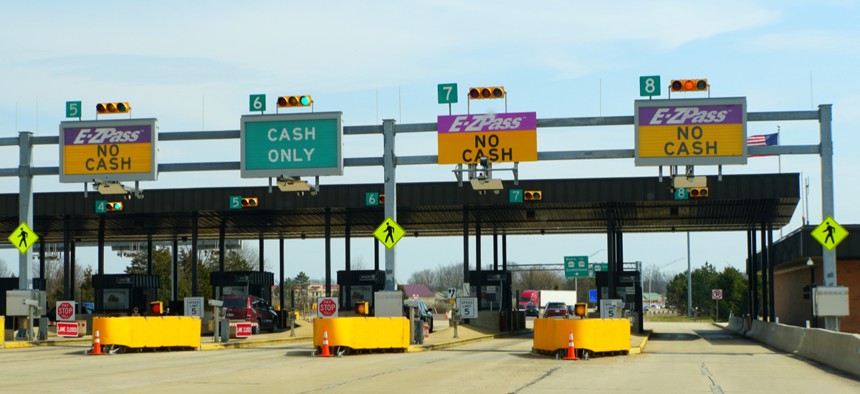Connecting state and local government leaders
COMMENTARY | The Covid-19 pandemic sped up the adoption of cashless toll payments in some states. But more progress is needed to take full advantage of the technology.
Lower traffic volumes during the early days of the coronavirus pandemic presented a perfect window for some states to install cashless tolling technology while causing only minimal disruptions on their roadways. Doing so offered benefits to both drivers and tollbooth operators wary of catching or spreading the virus through person-to-person exchanges of cash.
Despite that opportunity, some toll agencies have returned to cash payments. Unfortunately, this is a persistent pattern. Even with various types of electronic toll collection systems in existence for decades, completely cashless tolls have never become the norm. It’s time to change this so that drivers, road workers and government agencies can reap the benefits of true cashless tolls.
The Pros and Cons of Automated Toll Collection
The electronic toll road of the near future looks nothing like the toll roads we’re accustomed to. Today’s toll roads force traffic to slow down and increase accidents, subjecting employees, road workers and motorists to unnecessary risk, stress and confusion.
Collecting payments electronically eliminates the need for tollbooths. Additionally, cars and trucks can move uninterrupted—greatly increasing throughput, convenience and safety. For example, New Jersey saw a nearly 60% decrease in crashes on a stretch of roadway in part because they implemented cashless tolls. This occurred even with a traffic increase of more than 7 million cars passing through the tollway.
Despite these obvious benefits, cashless tolls haven’t become the standard simply because they can’t guarantee toll collection. With electronic toll collection systems, cash customers become customers who must be identified and invoiced, creating an increased potential for unpaid tolls and unpredictable revenue. With traditional tollbooths, drivers must come to a full stop and pay the toll in full, ensuring collection before they proceed. While the queueing of traffic creates inefficiencies and safety concerns, it also ensures consistent, effective revenue collection.
Overcoming the Obstacles to Cashless Tolls
The majority of toll roads rely on transponder devices inside a vehicle to streamline toll collection. The best example of this is the E-ZPass system shared by 39 government agencies across 17 East Coast states. When sensors register the transponder, E-ZPass automatically pulls the toll amount from a linked prepaid customer account. This kind of device-specific payment is a beneficial departure from the driver-specific physical payments of yesteryear.
Problems arise, however, when drivers don’t have a transponder in their car. Toll operators will try to record the vehicle license plate and mail a bill for the toll to the vehicle owner’s correct address. Unfortunately, this vehicle-specific approach has proven to be highly unreliable. Not only is this type of collection time- and labor-intensive, but the success rate is smaller than for fully automated prepaid transactions. That’s the bad news.
The good news is that tolling agencies that successfully overcome this obstacle can finally unlock the potential of cashless tolls. In the not-too-distant future, in-car payment systems linked to a vehicle’s internet-connected infotainment system (such as the one in this video clip) will allow toll road operators to instantly and seamlessly bill the correct vehicle owner, eliminating the need for transponders entirely.
This internet-connected model offers flexibility for both non-owner driver-paid and vehicle owner-paid models. Regardless, it could still be many years before vehicles supporting personalized in-car payments are ubiquitous enough to guarantee near 100% toll collection.
Until we can reach an entirely internet-connected model, then, agencies must find more efficient and reliable ways to collect tolls from drivers. That means getting better at recognizing vehicle identification numbers, linking data from agencies in different states and using tools such as blockchain and cloud-based services to store vehicle information and streamline overall administration. In Central Florida, a third-party provider provides a stop-gap solution by allowing drivers to make toll payments using their smartphones.
Certain states are already working toward regional interoperability in the hopes of streamlining the tolling process for drivers and increasing collections. Colorado, Georgia, Oklahoma and California’s tolling systems are interoperable within their states, and certain states have partnerships with others to ensure compatible tolling systems. Florida’s SunPass, for instance, is already usable in Georgia and North Carolina.
The point is that many cashless tolling solutions already exist, including commercial off-the-shelf software that can assist back offices by automatically reading license plate images or by matching plate numbers with up-to-date addresses to increase billing accuracy. These and other technologies can help make cashless tolling a reality on more highways.
In a decade or two, the widespread use of in-car and satellite-based electronic payments will make the idea of stopping to hand over cash at a tollbooth seem like a relic of the past. Until then, agencies can make significant progress by building the infrastructure needed for tomorrow’s electronic toll roads today.
Devang Patel is vice president of consulting and projects at Kyra Solutions, a trusted government partner specializing in the art and science of digital transformation and modernization. Barry Pelletteri is chief strategy officer at Kyra Solutions and former chief information officer of the New Jersey Turnpike Authority, holding more than three decades of experience in private sector executive leadership across multiple industries. Gene Conti, former U.S. Department of Transportation senior executive and secretary at North Carolina DOT, is the solutions advisor at Kyra Solutions and holds more than two decades of experience that helps him advise thought leadership, solution development and subject matter expertise.

NEXT STORY: Sensors Show How Rising Seas are Inundating One City’s Stormwater System



